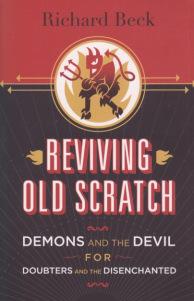 The problem, or rather a problem, of growing up Fundamentalist is taking things literally.I suppose we’re all born naive realists, learning only later that things aren’t what they seem.One of the dynamics of finding something new to say about demons involves an unconventional method of research.Richard Beck’s Reviving Old Scratch: Demons and the Devil for Doubters and the Disenchanted is a case in point.Being part of a series called “Theology for the People,” this book is not an exploration of literal demons or the Devil.Well, it kinda is and kinda isn’t.It is an engaging and often insightful treatment of the question of evil and what to do about it.Evil is a question, but most of us, at least pre-Trump, could recognize it when we saw it.
The problem, or rather a problem, of growing up Fundamentalist is taking things literally.I suppose we’re all born naive realists, learning only later that things aren’t what they seem.One of the dynamics of finding something new to say about demons involves an unconventional method of research.Richard Beck’s Reviving Old Scratch: Demons and the Devil for Doubters and the Disenchanted is a case in point.Being part of a series called “Theology for the People,” this book is not an exploration of literal demons or the Devil.Well, it kinda is and kinda isn’t.It is an engaging and often insightful treatment of the question of evil and what to do about it.Evil is a question, but most of us, at least pre-Trump, could recognize it when we saw it.
Beck is a professor of psychology.This meant that at several points I found myself pausing to consider some of the points he was making.Some parts didn’t work for me—welcome to the world of reading—but others were eye-opening.One thing that all books about the Devil seem to have in common is the observation that evil is clearly present in our world.Governments, and Beck uses Rome as an example, easily become oppressive and harmful to the weak and powerless.As a volunteer in a prison ministry, Beck knows whereof he speaks.When governments are run by the unstable (think of the one with a toothbrush mustache or any other who declare themselves geniuses) oppression follows.Evil not only bobs in the wake of oppression, it is oppression.Beck has a Christian anchoring—call it theology—behind this, but it clearly works even without that.
Getting over my literalism, I know that academic books about demons or the Devil come with more serious titles and more hefty price-tags.The value of a book, however, has to do with more than the cash you shell out for it.Beck does a service by offering a theology that isn’t too theological.I’ve known many candidates for the ministry who lost their compassion by getting tangled in the weeds of theology.Even to the point of making sarcastic remarks to someone who wanted to help them when they fell on the ice.I know myself, and I have to learn to trust those who practice theology in ways that I do not.This may not be conventional research, but it is important reading.Old Scratch, after all, is not just in the details.
